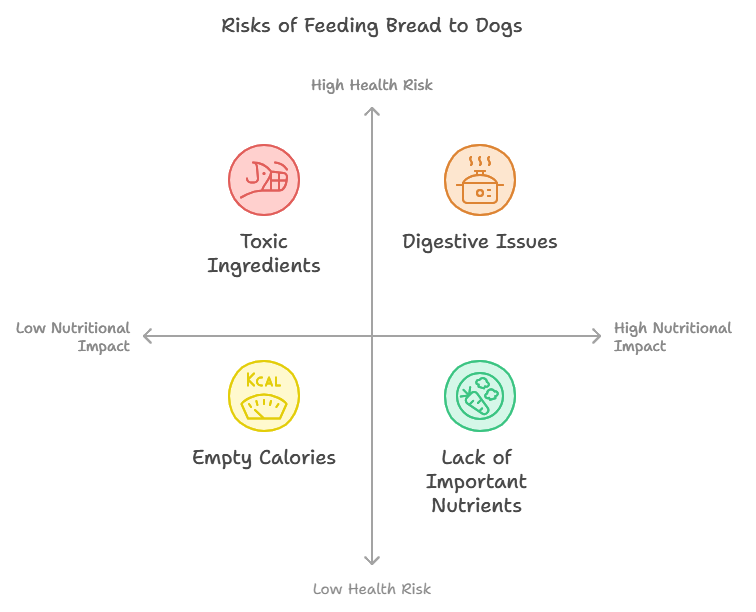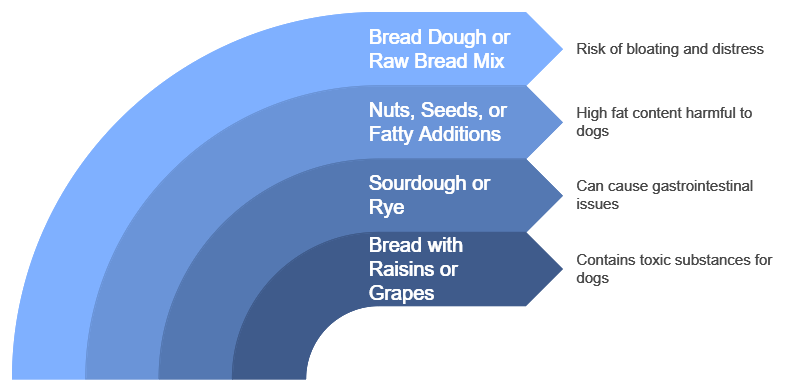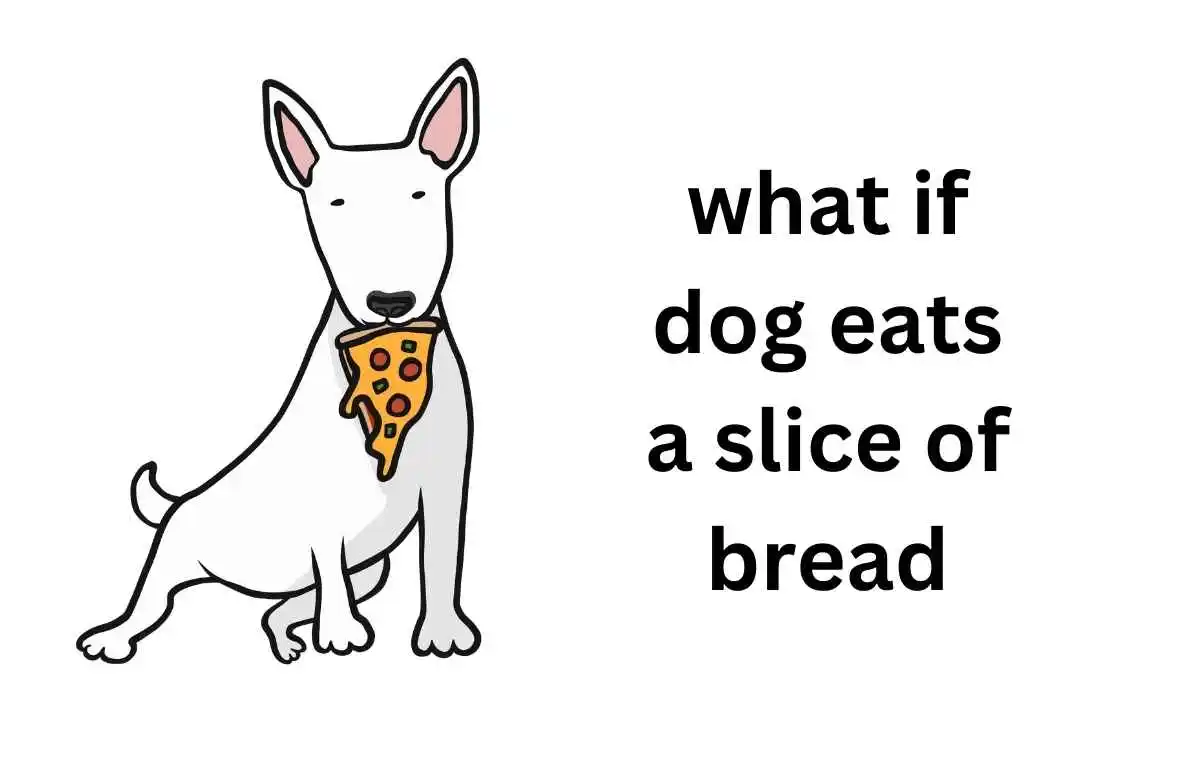Bread itself is not harmful for dogs dog eats a slice of bread and won’t typically cause more than an upset stomach. However, certain ingredients in some breads should be avoided, like raisins, chocolate, nuts, etc. which can be toxic. Fiber in bread may fill a dog up so they eat less of other foods, but it provides no nutritional value.
It’s best to dog eats a slice of bread in moderation rather than regular food due to being heavily processed and lacking nutrients. Eating too much at once could lead to indigestion symptoms like gas, bloating.
No need to panic from one slice, but monitor dog and contact vet if symptoms appear severe or long-lasting. Stick to dog’s normal diet and don’t overfeed on people food, even seeming harmless things like bread.
Dog eats a slice of bread? What to Know
Bread in moderation as an occasional treat is generally okay for dogs to eat. While a small piece of plain bread not cause harm, too much can lead to stomach issues due to being highly digestible. It fills them up but provides no balanced nutrition.
Some bread varieties may contain added ingredients that are unsafe or toxic for dogs like raisins, chocolate, nuts or seeds. These should always be avoided. Dogs have different calorie and nutrient needs than humans. A diet heavy in processed carbs from bread is not suitable as their main food source.
It’s best to only give bread occasionally as a small training treat or snack. Most of their daily meals should consist of a diet specifically formulated for dogs’ requirements. In moderation plain bread in small amounts is generally okay, but it offers no real health benefits. It’s unnecessary for dogs and not as nutritious as a balanced dog food.
Can dogs Digest sourdough bread
Sourdough bread safer for dogs than regular bread due to the fermentation process, it still should only be an occasional treat. The natural probiotics in sourdough can support gut health when consumed in moderation.
However, all bread provides calories but lacks essential nutrients dogs need. Too much could fill up a dog and replace more nutritious foods. Sourdough is also higher in carbohydrates which may cause issues like gas or diarrhea if eaten in excess. Smaller or more sensitive dogs may be at higher risk of these issues from eating bread of any kind.
It’s best to give only a small, bite-sized piece as a reward to avoid overeating or choking hazards. Watch for signs of an upset stomach after to determine individual tolerance. While a little sourdough as a rare snack will likely pose no problem for most dogs, it’s always wisest for owners to check with their vet if they have any concerns about treats or diet changes.
what if dog eats a slice of bread
If a dog eat one slice of bread, it would not cause any serious effects for dogs. Their digestive systems are generally able to handle an occasional small portion of human food.
Larger dogs would most likely not experience any digestive troubles from a single slice. However, no nutrition would be provided aside from empty calories.
A one-time indulgence in bread probably won’t hurt a dog, but it’s still not recommended as they may acquire a taste for table food and start begging. Their regular diet should focus on foods made for dogs’ health needs.
Risks of Feeding Bread to Dogs

Lack of important nutrients
As omnivores, dogs need a source of complete protein to support their organs, tissues and growth. However, bread contains only small amounts of lower quality carbohydrate-based protein from grains. It also has minimal fat, vitamins and minerals that dogs utilize for brain function, skin/coat health and immune system support.
Deficiencies can cause problems over time like poor bone development, weakness or skin issues. As bread primarily offers empty carbs and calories, dogs are unlikely to get the balanced nutrition they need from a primarily bread-based diet.
Empty Calories
While bread supplies dogs with carbohydrate calories, it provides little nutritional value beyond this. The flour carbohydrates in bread are rapidly broken down into simple sugars, giving them a quick burst of energy but no sustained sustenance.
Without adequate protein, fat or micronutrients to promote fullness, the carbs aren’t very filling. This makes overeating easy and the excess calories are readily stored as body fat if not burned off through exercise.
Digestive issues
Bread may be easily digested by dogs, its lack of fiber can disturb the digestive system. Highly processed and low in plant material, bread moves too quickly through the GI tract. It does not provide enough bulk and residue to stimulate regular bowel movements. This can cause constipation issues in dogs if consumed as a primary food source over time.
Toxic Ingredients
Many commercial bread varieties contain problematic additives that are harmful, even lethal, for dogs if ingested: Xylitol : An artificial sweetener that causes dangerous blood insulin spikes, putting dogs at risk of hypoglycemia and liver toxicity.
Grapes and dried vine fruits are nephrotoxic to canines, destroying kidney tubules at even a few pieces. One of the most poisonous foods, linked to hind limb weakness, rapid heart rate and hyperthermia in dogs.
Can dogs eat banana bread
Bananas are non-toxic and provide potassium, which is good for dogs. Bananas alone make up a very small portion of banana bread. However, some banana bread recipes include nuts, chocolate chips or other additives that should be avoided.
Also, as with any human food, too large a portion could lead toGI upset in some dogs. It’s best to give just small pieces of plain banana bread and monitor the dog for any digestion issues afterwards. Any dried fruit, nuts or chocolate in the bread pose choking hazards as well.
Is bread safe for puppies?
Puppies have small and developing digestive systems. Too much bread could lead to issues like gas, diarrhea or vomiting. Bread provides little nutritional value for growing pups. It’s mainly empty carbs and calories versus the protein and nutrients needed at this stage.
plain white or wheat bread given in very small, occasional treats is likely okay for most puppies. But it’s best avoided as a regular part of their diet or in large amounts, which could upset their tummies or nutrition. As with any people food for pups, start with tiny bits and monitor their response.
Can dogs eat garlic bread?
Garlic bread should generally be avoided for dogs. While small amounts of cooked or minced garlic are okay occasionally for some dogs, large amounts can potentially cause toxicity. The garlic in bread poses some risks. Garlic contains compounds like allicin that can be harmful to dogs if consumed in high doses.
Eating garlic bread could expose a dog to too much garlic at one time. Additionally, the butter, oils or other ingredients in bread, as well as the suggestion of ingredients like cheese, herbs or seasonings, make garlic bread an unhealthy, rich human food that offers dogs no real nutritional value. It’s best to steer clear of sharing garlic bread with dogs and instead offer small amounts of plain bread or unseasoned meat as rare special treats if any people food is to be given.
How can I feed Bread to my dog?
Give bread pieces that are small enough to easily swallow to avoid choking risk. Monitor your dog closely when eating. Bread will count as part of your dog’s daily calorie intake, so adjust other meal portions accordingly to avoid weight gain from too many empty carbs. Consider bread as an occasional treat, not a meal replacement. A very small piece here and there as a snack or training reward is likely fine for most dogs.
Monitor your dog’s reaction. Some dogs may have wheat or gluten sensitivities that cause digestion issues. Discontinue use if you notice gas, diarrhea or other side effects. Ask your vet for guidance on amounts if your dog has dietary restrictions or health conditions like diabetes that require regulated carb intake.
Which type of Bread Dangerous For Dogs?

Bread containing Raisins or Grape Products
Raisins and grapes can cause kidney failure in dogs even in small quantities. The exact toxin is unknown. Throw away any bread with added dried fruit like raisins, cranberries, dates immediately. Do not feed.
Sourdough or Rye
These breads contain grains like rye that can ferment in a dog’s stomach causing alcohol toxicity. Early signs are similar to drunk behavior with possible vomiting, diarrhea, decreased coordination or seizures. The danger comes from abnormal gut bacteria breaking down the grains into alcohol inside the dog.
Nuts, Seeds or Fatty Additions
Nuts and seeds can pose a choking risk if too large. They are also high in fat calories. Fatty meat, cheese or butter additions make bread an unhealthy, fattening treat for dogs. These ingredients provide little nutrition but extra calories that can easily lead to weight gain.
Bread Dough or Raw Bread Mix
Yeast produces ethanol as it rises which can be toxic in large enough quantities for small dogs. Raw bread or pizza dough can also cause gut blockages as it expands inside the stomach before digestion. Fully baked bread in small amounts is safest to avoid toxic reactions from uncooked or risen dough/batter.

[…] Dogs eat wheat bread but only in moderation. Plain wheat bread can be a safe treat for most dogs, but it should never replace their regular, balanced diet. Always check the ingredients and serve in small portions to avoid potential health issues. Remember, your dog’s health and happiness rely on thoughtful choices and occasional indulgences that complement their overall nutrition. […]